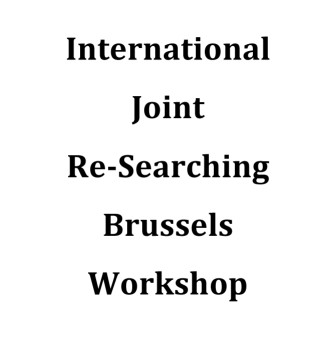International Joint
Re-Searching Brussels Workshop
between KU Leuven Faculty of Architecture International Master of Science in Architecture, Brussels & Ghent – BELGIUM and Tunghai University Master International Architectural Design, Tai Chung – TAIWAN
Workshop Guidance Chotima Ag-ukrikul, Chih Feng Shu and Burak Pak
Brussels city Guide Jan Bruggemans
Re-searching is a one week long of fieldwork, research and discussion workshop. In this workshop three different research methods will be introduced to the participants. These methods have been developed by different researchers in the field of architecture and urban design to compare, to build the understanding and to initiate discussion about the sites. The three methods are Spaces Syntax, Walkability and Eatscape, these are methods with very different stance. Space Syntax[1] is quantitative research method with evidence-based for producing strategy. Walkability is about experiencing and evaluating through walking and Eatscape is about in-depth and ethnography approach toward understanding the quality of a site.
Due to the limitation of time in this workshop, participants from Tunghai University will start working on Space Syntax before the start of the workshop and the results of their Space Syntax analysis will be presented during the introduction of the workshop. These results will also be further used for comparison during the discussion session. The aim of this workshop is to stimulate fieldwork, critical discussion and learning exchange between all participants. The results of these different methods of researches will be the base for discussion on the discussion day on Friday 4th April between 10.00-13.00h.
Eatscape track– Guidance (Chotima Ag-ukrikul)
The quality of city living depends closely on the quality of its everyday life and ‘eating’, among many everyday activities, contributes tremendously toward how people experience a city. ‘Eating’ involves everybody every day; and the recurrence of this everyday acts of eating craft their traces onto the physical space of a city. Eatscape in this workshop is about learning from spaces for commensality[2] and building the understanding of the impacts of commensality on the urban commons. Through Eatscape lens participants are encouraged to discuss ‘what make a place its particular experience and feels to us’ through Eatscapes.
Participants will be given pre-selected Eatscapes site to carry out fieldworks, where participants are also asked to reflect their experience through designerly lens following a list of Eatscape research approach. The results of this fieldwork will be used as the base for comparison and discussion with the other 2 methods during the discussion session.
Walkability track– Guidance (Burak Pak)[3]
Walkability is a measure of how walking friendly an area is. It has been prescribed as an essential urban quality by numerous authorities during the last century (Gehl, 2010) (Jacobs, 1961) (Lynch,1961). Various evaluation methods have been introduced from the perspectives of medicine, transportation, environmental design and psycho-sociology, including a significant number of alternative performance dimensions: connectivity of path network, linkage with other transportation modes, land use patterns, safety (traffic/social), the quality of the path context, spatial definitions and overall explorability (Southworth, 2005).
The walkability track of the workshop is based on two main motivations: the potential of walkability as a performance indicator for urban spaces and the new possibilities offered by the social media and novel information and communication technologies for the collective location-based representation of individual experiences.
The workshop follows the research tradition of Lynch (1961), a qualitative research method focusing on exploring how people experience walkability. It makes use of the web-based social content management platform developed in the framework of a post-doctoral research project. In this method, the students make several walk-throughs in a predefined urban area while making notes and collecting visual information which are entered on the platform after the study.
Discussion – The aim of the discussion is the exploration of the walkability concept and the extraction of its culturally bound dimensions while establishing links relations between the Eatscape, the Walkability and the space syntax study made by the participants from Tunghai University. Based on this exploration, the participants will develop alternative ideas for enabling spatial interventions in the chosen site areas. The discussion will be record and used as part of the future exhibits and on the Geoweb 2.0 environment for this workshop.
Read more on the planning, lectures, participants, … here

